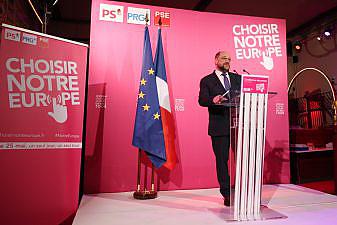Schulz’s European Parliament power games carry on regardless
Schulz’s European Parliament power games carry on regardless

The German social democrat Martin Schulz continues to abuse his position as president of the European Parliament. Whenever the political establishment is threatened, he wades in. Last week he turned coat when it came to a vote on morally dubious tax agreements, voting to oppose the setting up of a commission to investigate the matter. In addition, he opposed the preparation of a proposal for changes to the EU Treaty to put an end to the travelling circus which takes the Parliament to Strasbourg every month, at huge unnecessary expense to the taxpayers. The EP’s two biggest political groups, the centre-right European People’s Party (EPP) and the centre-left Progressive Alliance of Socialists and Democrats (S&D) think it’s all for the best: Schulz is simply looking after their interests. But the voice of parties outside the establishment is growing ever louder. Pride comes before a fall and the day is approaching when even someone like Schulz, along with the political establishment as whole, will have to explain himself.
The SP had our own criticisms of the proposal from the Greens for a parliamentary enquiry into the so-called LuxLeaks, having not found the mandate it offered well-formulated. At the same time it is of course of the greatest importance that we clarify matters in relation to shady tax deals between the Luxembourg government (amongst others) and multinationals. We also want to know what the role of recently-appointed Commission President Jean-Claude Juncker when he was a Luxembourg government minister. Did he know about these immoral agreements and if so, why did he make them? On that matter, no stone should be left unturned. So I was also planning to bring forward some amendments adjusting the mandate, as soon as the proposal was voted on, but so far this hasn’t happened. Schulz has simply prevented any such vote, and no vote has been taken. And this is a man who calls himself a democrat. Behind the scenes we haven’t heard the last of this, but for the time being we don’t have a committee of enquiry, only an ordinary parliamentary committee which will examine the matter. Thanks to Schulz, who undoubtedly acted at the request of the EPP, scared as they were that Juncker, of the same centre-right political current, would find himself in difficulties.
Last week it became known also that Schulz had pulled the rug out from under the idea that he was going to work on a proposal for a treaty amendment to stop the travelling Strasbourg-Brussels circus. He has now added this to the mandate of Guy Verhofstadt of the ALDE group, the Liberals; and Verhofstadt is the EP’s biggest europhile. He will now write a general report on possible treaty amendments. This will be a ‘Recommendation’ rather than a legislative report, and will thus carry less weight than a report in which a concrete amendment has been worked out. Moreover, the Verhofstadt report will undoubtedly not be ready any time soon, and all the time that it takes there will be nothing concrete on the table. The network of MEPs who want to put an end to the travelling circus, a group of which I am one of the vice-chairs, will meet shortly to discuss how we can still carry the day. In this case once again it’s a matter of a struggle against the political establishment, in this case an establishment consisting of the German and French centre-right and centre-left.
The European Parliament likes to be seen as the ultimate symbol of European democracy. People like Schulz enable us to see, however, that it promotes above all the establishment’s interests. Looking at the political developments in southern Europe, these can only turn against the institution in response to such an attitude. People want to be represented. This is hard enough in the case of such an unusual parliament, one which has neither a people nor a government, but it will become totally impossible if the president of this parliament doesn’t take the trouble to listen to new tendencies far closer to the people than is the establishment which he represents. It is for these reasons that I expect in the years to come that not only in southern Europe but in other places, including the Netherlands, there will be a reckoning with this establishment, and that this will also occur within the European Parliament. There’s only so much people will put up with.
- See also:
- Dennis de Jong
